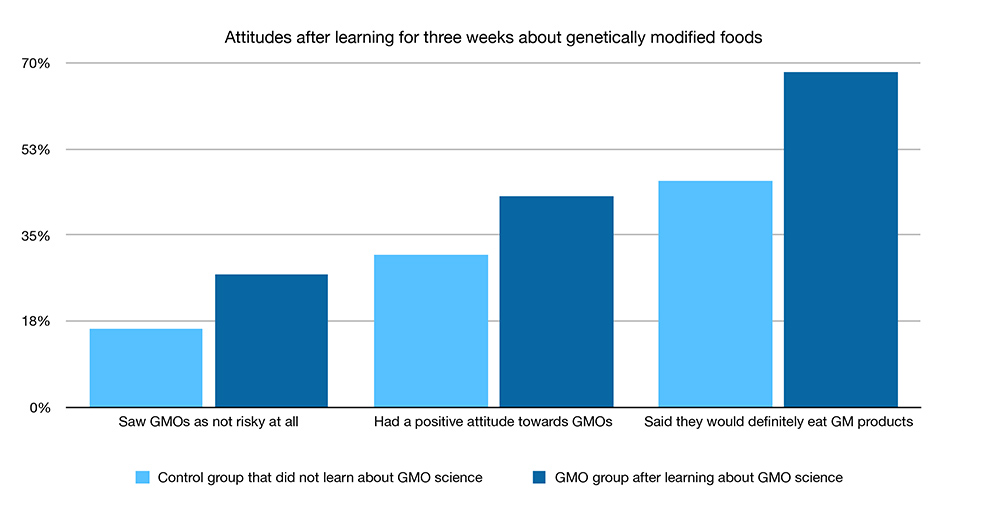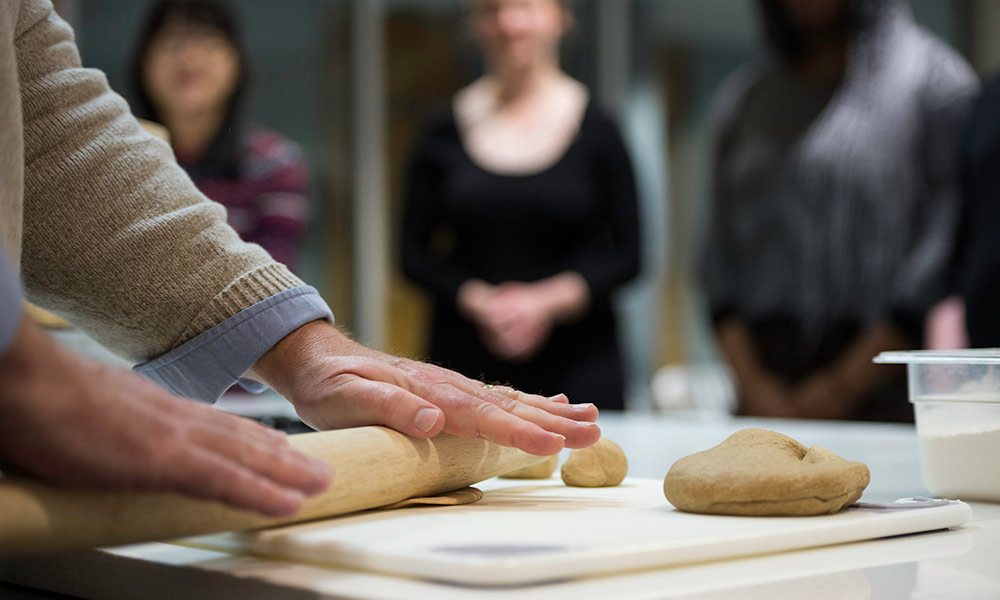Jonathon McPhetres, a newly minted PhD in psychology from the University of Rochester, admits he’s “personally amazed” what we can do with genes, specifically genetically modified food—such as saving papayas from extinction.
“We can makes crops better, more resilient, and more profitable and easier for farmers to grow, so that we can provide more crops around the world,” he says.
Yet the practice of altering foods genetically, through the introduction of a gene from a different organism, has courted controversy right from the get-go. While genetically modified organisms (GMOs) are considered safe by an overwhelming majority of scientists, including the National Academy of Sciences, the World Health Organization, and the American Medical Association, only about one third of consumers share that view.
One reason for the divide is that critics of genetically modified food have been vocal, often decrying it as “unnatural” or “Frankenfood”—in stark contrast to a 2016 review of published research that found no convincing evidence for negative health or environmental effects of GM foods.

A team of psychologists and biologists from the University of Rochester, the University of Amsterdam in the Netherlands, and Cardiff University in Wales, set out to discover if the schism could be overcome; that is, to see if consumers’ attitudes would change if the public understood the underlying science better.
The short answer is “yes.” The team’s findings were recently published in the Journal of Environmental Psychology.
“Political orientation and demographics inform attitudes and we can’t change those,” says McPhetres, the study’s lead author. “But we can teach people about the science behind GMOs, and that seems to be effective in allowing people to make more informed decisions about the products that they use or avoid.”
Previous research has shown that more than half of Americans know very little or nothing at all about genetically modified food.
In a series of studies, the team discovered that people’s existing knowledge about GM food is the greatest determining factor of their attitudes towards the food—overriding all other tested factors. In fact, existing GM knowledge was more than 19 times higher as a determinant—compared to the influence of demographic factors such as a person’s education, socioeconomic status, race, age, and gender.
The team replicated the US findings in the United Kingdom and the Netherlands, where opposition to modified food has tended to be higher than in the United States, and where GM food is highly regulated in response to consumer concerns.
In one study, using a representative US sample, participants responded on a scale of 1 (don’t care if foods have been genetically modified), 2 (willing to eat, but prefer unmodified foods), to 3 (will not eat genetically modified foods). Next, the team asked 11 general science knowledge questions—such as whether the universe began with a huge explosion, antibiotics kill viruses as well as bacteria, electrons are smaller than atoms, and how long it takes for the earth to orbit the sun. In study 2, participants took an additional quiz about their knowledge about the science, methods, and benefits of GM foods and procedures.
The team found that specific knowledge about GM foods and procedures is independent from a person’s general science knowledge—making the first (GM knowledge) a nearly twice as strong predictor of GM attitudes.

Genetically modified food: A guide to overcoming skepticism
The researchers followed up by conducting a five-week longitudinal study with 231 undergraduates in the US to test, first, if a lack of knowledge about GM foods could be overcome by teaching participants the basic science behind GM technology, and second, if greater knowledge would alter attitudes. McPhetres worked with Rochester colleague Jennifer Brisson, an associate biology professor, who vetted the students’ learning materials.
The team discovered that learning the underlying science led to more positive attitudes towards genetically modified foods, a greater willingness to eat them, and a lowered perception of GM foods as risky.
Their findings, argues the team, lend direct support for the deficit model of science attitudes, which—in broad terms—holds that the public’s skepticism towards science and technology is largely due to a lack of understanding, or absence of pertinent information.
The team’s online modules avoid confrontational approaches “which threaten preexisting beliefs and convictions,” suggesting a relatively simple guide for how to overcome skepticism about GM foods: focus on the actual underlying science not the message.
For McPhetres, the studies tie neatly into his larger research focus on people’s basic science knowledge and general interest in science—and how to improve both.
Knowledge and appreciation of science—“that’s the kind of information that people need to make informed decisions about products they use, and the food they eat,” say McPhetres who’s now heading to Canada for a joint post-doctoral appointment between the University of Regina in Saskatchewan, and the Massachusetts Institute of Technology.
Read more

Does awe lead to greater interest in science?
In a recent study, participants who watched awe-inducing nature videos or virtual reality simulations consistently reported greater interest in science and greater awareness of gaps in their knowledge.

Food for thought—and research
In fields like anthropology and linguistics, scholars must earn the trust of the communities in which they work. A basic key to that trust involves the sharing of food.





